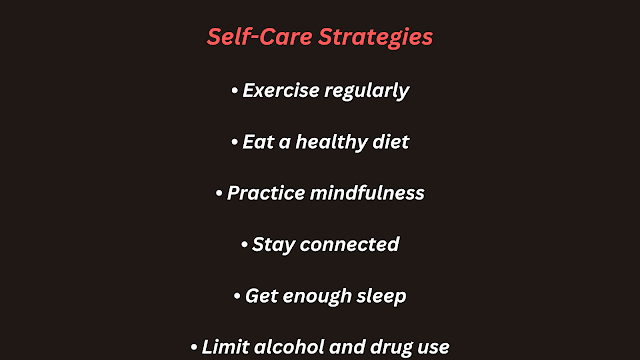 |
| Mental health is a critical aspect of our well-being |
Mental health is a critical aspect of our happiness that affects our emotions, thoughts, and behavior. It encompasses a range of conditions, including depression, anxiety, and stress, which can significantly impact a person's life. Here is an overview of some of the most common mental health issues and their treatments:
Depression: Depression is a mental health condition characterized by persistent feelings of sadness, hopelessness, and loss of interest in activities. It can impact a person's daily functioning, including work, school, and relationships. The most effective treatments for depression are a combination of psychotherapy and medication. Cognitive-behavioral therapy (CBT) is a popular form of psychotherapy that focuses on changing negative thought patterns and behaviors. Antidepressants, such as selective serotonin reuptake inhibitors (SSRIs), are commonly used to treat depression.
Anxiety: Anxiety is a feeling of unease, worry, or fear that can be triggered by a specific situation or a general feeling of unease. It can manifest in various forms, including social anxiety, panic disorder, and generalized anxiety disorder. The most common treatment for anxiety is a combination of therapy and medication. Cognitive-behavioral therapy (CBT) is also an effective treatment for anxiety. Medications such as benzodiazepines and selective serotonin reuptake inhibitors (SSRIs) are often used to treat anxiety.
Stress: Stress is a natural response to situations that require attention, effort, or focus. However, prolonged or chronic stress can lead to physical and mental health problems. Stress management techniques such as meditation, deep breathing, and exercise can help reduce stress. Therapy, such as cognitive-behavioral therapy (CBT), can also help individuals manage stress.
Therapy: Therapy, also known as counseling or psychotherapy, is a form of treatment that involves talking to a mental health professional about emotional and mental health concerns. Therapy can help individuals develop coping skills, improve communication and relationships, and manage mental health conditions. Common forms of therapy include cognitive-behavioral therapy (CBT), dialectical behavior therapy (DBT), and psychodynamic therapy.
Self-care: Self-care refers to activities that individuals engage in to promote their mental and physical well-being. It can include things like exercise, healthy eating, meditation, journaling, and spending time with loved ones. Self-care is important for managing mental health conditions and reducing stress.
Medication: Medications can be used to treat mental health conditions, such as depression, anxiety, and bipolar disorder. Commonly prescribed medications include antidepressants, antipsychotics, and mood stabilizers. Medications can help manage symptoms and improve quality of life, but they should always be used under the guidance of a mental health professional.
When to Visit Doctor
It's important to seek professional help if you're experiencing persistent or severe mental health symptoms. Here are some signs that you may need to see a doctor:
- You're experiencing intense or persistent feelings of sadness, hopelessness, or worthlessness
- You're having thoughts of self-harm or suicide
- You're having trouble sleeping or sleeping too much
- You're experiencing intense anxiety or panic attacks
- You're struggling with substance abuse or addiction
- You're having difficulty with daily activities, such as going to work or school
If you're experiencing any of these symptoms, it's important to seek professional help from a mental health provider, such as a psychiatrist, psychologist, or licensed therapist. They can provide an assessment, diagnosis, and treatment plan tailored to your specific needs.
In addition to seeking professional help, there are also things you can do at home to support your mental health. Here are some self-care strategies that can be helpful:
- Exercise regularly: Exercise can help reduce stress and improve mood. Try to get at least 30 minutes of moderate exercise most days of the week.
- Eat a healthy diet: A balanced diet with plenty of fruits, vegetables, and whole grains can help support overall health, including mental health.
- Practice mindfulness: Mindfulness techniques, such as meditation or deep breathing, can help reduce stress and improve mental well-being.
- Stay connected: Stay in touch with family and friends, and consider joining a support group or online community for people with similar experiences.
- Get enough sleep: Aim for 7-9 hours of sleep per night, and establish a regular sleep schedule.
- Limit alcohol and drug use: Substance
use can worsen mental health symptoms and interfere with treatment.
Remember, seeking professional help is important if you're struggling with mental health issues. Your mental health provider can provide guidance on how to manage symptoms and develop a treatment plan tailored to your needs. Additionally, self-care strategies can be helpful for managing symptoms and supporting overall mental health.









0 Comments